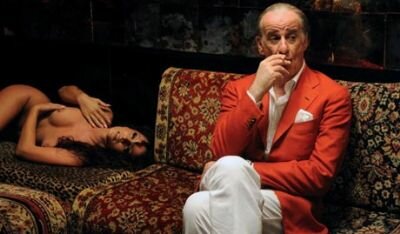|
|
| Tookey's Review |
|
| Pro Reviews |
|
| Mixed Reviews |
|
| Anti Reviews |
|
| Cast |
|
| |
 |
| |
| Released: |
2013 |
| |
|
| Genre: |
DRAMA
HORROR
|
| |
|
| Origin: |
Italy/ France |
| |
|
| Colour: |
C |
| |
|
| Length: |
140 |
|
| |
|
| |
|
|
| |
|
|
Beautiful and timely.
|
Reviewed by Chris Tookey
|
Here is an art-house film that can be confidently recommended to lovers of Federico Fellini (Eight and a Half), Ettore Scola (Splendor) and Italy in general.
Writer-director Paolo Sorrentino (Il Divo) is a master of cinematic imagery, even if his plots leave a great deal to be desired. He creates deliberate echoes of Fellini’s La Dolce Vita with his sympathetic character study of an ageing Arts journalist and party animal - a grey, urbane Toni Servillo (pictured right), looking a lot like Philippe Noiret, who played the crusty but lovable projectionist in Cinema Paradiso.
The story is not the thing here. This is a love letter to Rome, but also a warning that fashion, desires of the flesh and sensual vices in general may divert you from things more worthy of your time.
In our hero’s case, his taste for parties, alcohol and alluring women, of whom there are many in this movie, in various degrees of undress, have prevented him from finding true love, or making the most of a literary talent that seems to have dried up, the more “successful” he has become as a journalist.
All he has left are a civilised set of values, a somewhat ruthless honesty and an extremely pleasant apartment with a fine view of the Coliseum. And a job, with a sympathetic, admiring editor.
The film certainly spoke to me. And I sensed a groundswell of empathy among critics around me, many of whom are currently being culled as though they are badgers carrying diseases fatal to the more bovine instincts in their newspapers.
Like Sorrentino’s best-known film, Il Divo, it’s a study of corruption. Underlying the film is a feeling of lives distorted by the need for social success, patronage and conformity to fashion.
Most people I know are smugger than I am about Britain’s excellence in the Arts. This left me wondering, not for the first time, why there are no British films willing to tackle the major themes of our age.
The Great Beauty is an engaging mixture of the world-weary and the clear-sighted. Its commercial prospects aren’t great, but its artistic qualities are. Many are bound to compare this to Fellini’s 1973 film, Roma and Roberto Rossellini’s Rome, Open City (1945). Actually, it’s better: less rambling, just as beautiful and with a central character to whom many well-educated, middle-aged people will find it easy to relate, even if they aren’t journalists.
|
|
|
